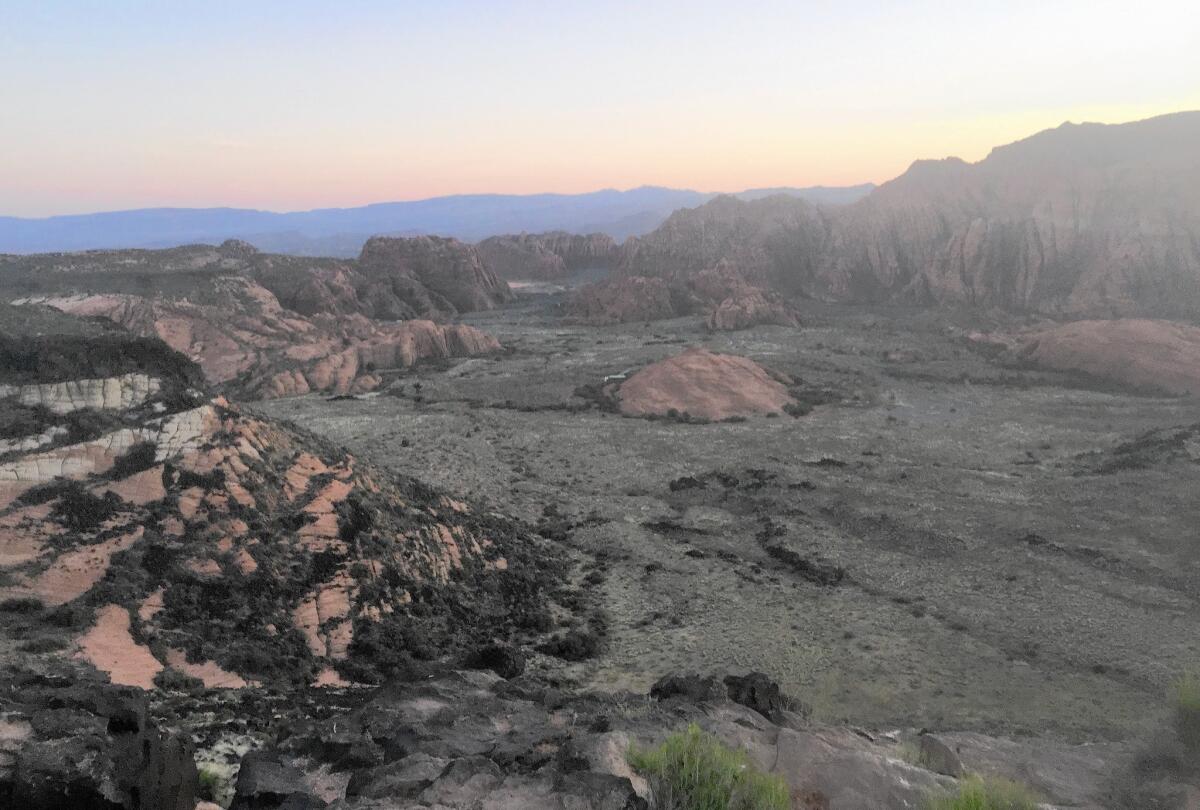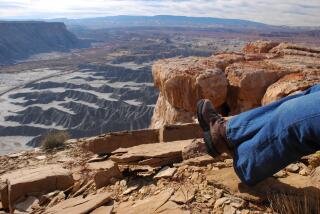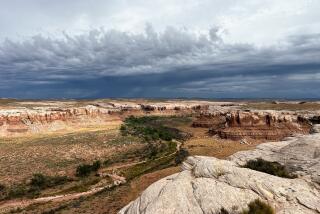In Western states, idea of reclaiming federal land still has a strong allure

Reporting from MILLARD COUNTY, Utah — Spread over 6,500 miles of sparse scrub and alkaline soil, Millard County is one of Utah’s poorest. But for five years, the cash-strapped county so remote it was the site of a Japanese American internment camp in World War II still found $1,000 to send to the American Lands Council.
The Lands Council’s goal is grand but simple: to wrest control of vast swaths of land from the federal government and turn them over to the states.
At stake are hundreds of millions of dollars, even billions, that could be made off land administered by the federal government. The big-dollar opportunities include oil leases in Utah grassland, all-terrain vehicle tourism in Arizona and rare-earth mineral mining in Nevada.
The council’s pitch, often to rural county commissions: That money could be theirs, if they’re willing to pay a little up front to help wage the land transfer battle.
Money is speech, said Millard County Commissioner Jim Withers, explaining why the county sent public funds to the Lands Council.
“One thousand dollars buys you a seat at the table,” Withers said. Referring to federal land policies and Washington officials, he added, “I know it won’t change overnight, but at least they’ll have to listen to us.”
In Klamath County, Ore., the sheriff’s office had to cut patrols and close jail beds, but Klamath still shelled out $1,000 to the Lands Council, as did Okanogan County, Wash., despite falling property tax revenue. Utah’s wealthier Kane and Washington counties give $25,000 each year, the cost of membership in the Lands Council’s Gold Level, which buys voting rights.
Americans for Prosperity, the group backed by the conservative Koch brothers, contributes to the Lands Council, though in 2013, the last year for which records were available, the council took most of its $200,000 from membership dues, including public entities such as county commissions.
The council’s pitch resounds in rural communities that have watched their economic fortunes tumble — timber towns in Oregon, grazing land in Utah, mining clusters in the Northern Rockies — and now struggle to pay for basic services including law enforcement, roads and schools. The idea also tugs at the heartstrings in a place that defines itself by its self-reliance and freedom from government interference.
The land transfer movement harnesses the animus toward the federal government that peaked in the 1980s with the Sagebrush Rebellion and was echoed last year in the armed standoff between the U.S. Bureau of Land Management and supporters of Nevada rancher Cliven Bundy.
The Lands Council preaches a four-tiered strategy for taking back public lands, called ENLL for Education, Negotiation, Legislation and Litigation.
Spearheading the work is the council’s president, Ken Ivory, and he travels the country trying to drum up support for the transfer movement. Much of the group’s money goes to him. Of the $209,177 the Lands Council raised in 2013, $95,000 went to Ivory and another $19,000 to his wife, Rebecca.
Ivory is also a Utah state representative and helped push Utah to fund a $2-million state war chest dedicated to legal consulting, public relations and lobbying on the issue.
Utah also passed legislation in 2012 demanding the return of all federal land to its control by 2014.
The federal government didn’t comply. And it probably never will.
Legal and economic scholarship on Utah’s transfer bill concludes that the federal land transfer is never going to happen, and if public lands were indeed somehow given to the states, the result would be a financial disaster.
“It’s a fantasy for places in economic trouble, which is fruitful ground for rainmakers and snake-oil salesmen,” said Montana state Sen. Pat Connell, a Republican who has heard pitches from Montana transfer movement proponents.
That hasn’t deterred those invested in its success.
Nearly every Western state has someone carrying the banner for the transfer movement. In Montana, it’s state Sen. Jennifer Fielder, backed in part by oil and gas interests. In Arizona, Republican state Sen. Al Melvin has been loudest.
Nationally, it’s getting noticed. In March, Sen. Lisa Murkowski (R-Alaska), chairwoman of the Energy and Natural Resources Committee, sponsored a budget amendment, which sailed through the Senate, that supported the idea of moving federal lands to the states.
It’s a message Ivory takes around the country, and he molds his pitches to his audience. In the forests outside Portland, Ore., he tells rapt crowds about getting their valuable timberland back from the feds. In New Hampshire, he warns that the U.S. is losing the race for rare-earth minerals with China. They’re available on Western lands, if only the government would get out of the way.
The legal argument behind the transfer movement begins with the “enabling acts” that created most states from territories in the West. In exchange, the states had to concede control of the land to the federal government. But transfer movement advocates are focused on one clause that’s standard language in the enabling acts of the states: “until the title thereto shall have been extinguished.”
That phrase alone, they argue, entitles states to reclaim land. But legal scholars from the 1930s on have flatly denied this analysis. The enabling acts allow the federal government to give up its title to the land, but hardly mandate it.
“Utah’s claims, like those of its neighbors, are doomed to failure,” wrote two University of Utah law professors. “The federal government has absolute control over federal public lands, including the constitutional authority to retain lands in federal ownership.”
The news isn’t much better from economists, including Jan Elise Stambro, who had the unenviable task of throwing cold water on the transfer movement at a meeting of its proponents in Richfield, Utah.
Utah’s land transfer strategy relies on oil, a volatile commodity that looked like a sure bet before the oil market collapsed.
Stambro said a drop in the price per barrel would be catastrophic to oil leases on public land and the state’s finances. Without a strong oil industry, she said, Utah’s financial obligations for maintaining public lands, fighting fires and all the other responsibilities of the federal government would far outweigh what the land would generate.
Stambro ran through the uninspiring prognostication. Transfer movement proponent and Assistant Utah Atty. Gen. Tony Rampton was there to challenge her.
It was Rampton’s chance to defend the financial underpinnings of the transfer movement and argue it is a viable vehicle for economic growth. Instead, he said this:
“It’s not about the money. It’s the principle.”
Twitter: @nigelduara
More to Read
Sign up for Essential California
The most important California stories and recommendations in your inbox every morning.
You may occasionally receive promotional content from the Los Angeles Times.











